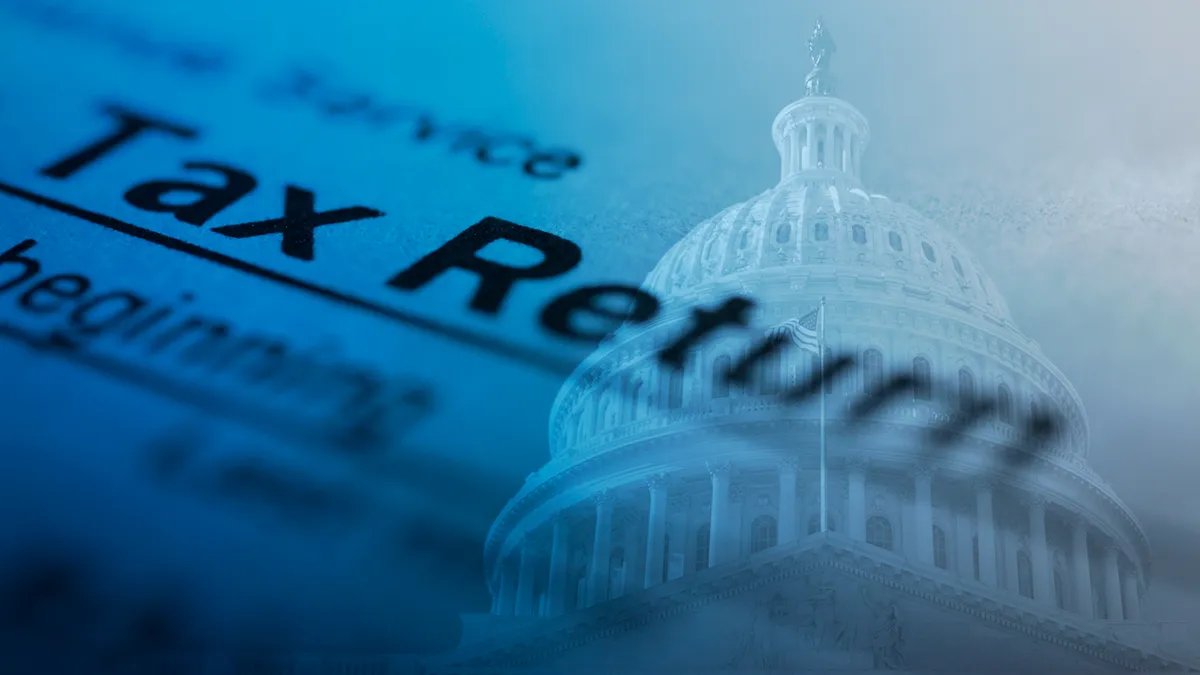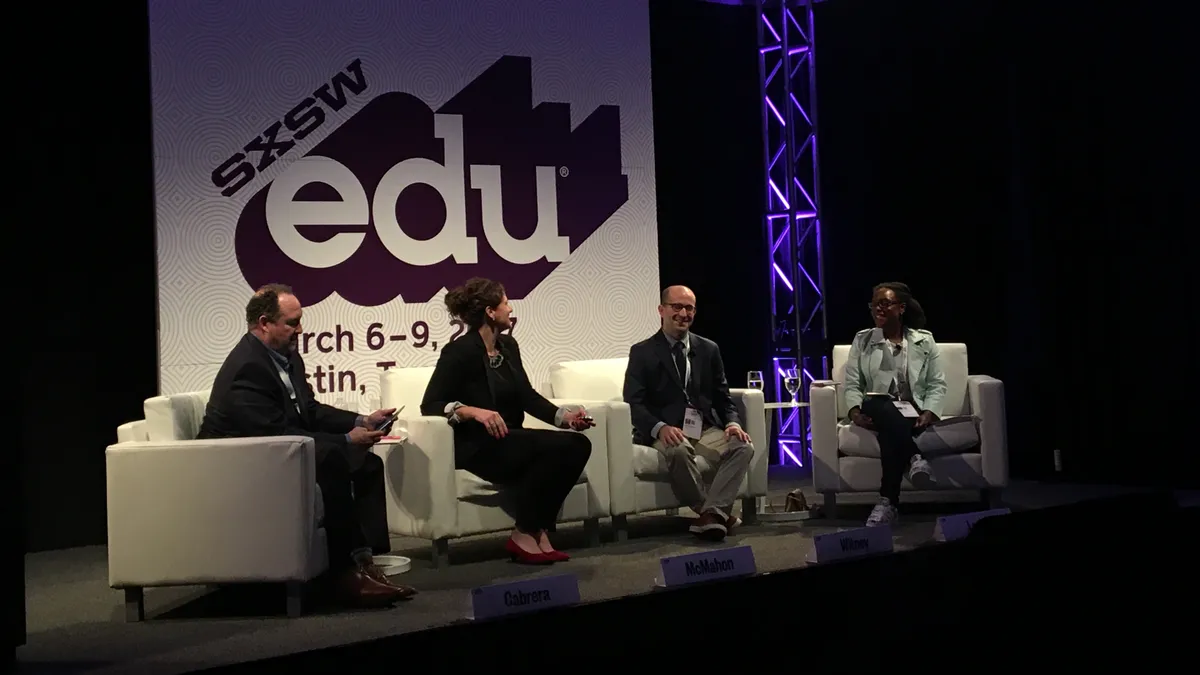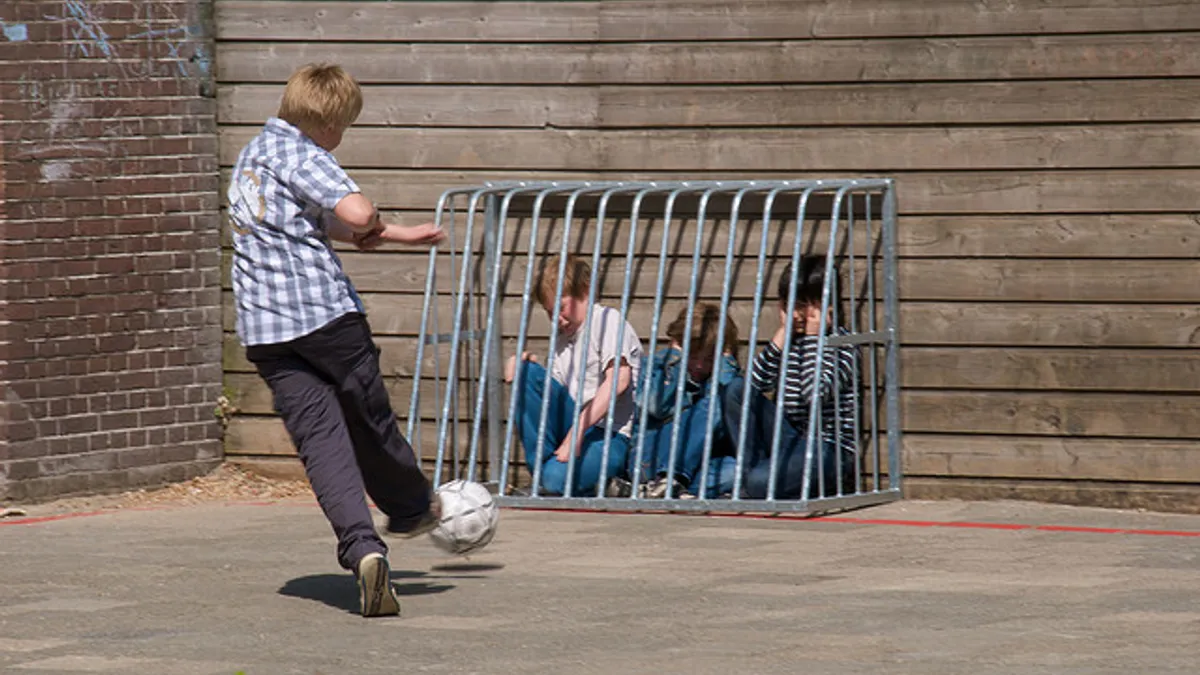K-12: Page 135
-
Tennessee toughens requirements for school bus drivers
The law requires districts and charter schools to have transportation supervisors.
By Linda Jacobson • Jan. 2, 2018 -
Sports programs at some Minneapolis schools struggling amid budget cuts
Teams are turning away students who want to play because they can’t afford to hire additional coaches.
By Linda Jacobson • Jan. 2, 2018 -
Trendline
Curriculum
Educators are exploring a variety of strategies to improve students’ learning experiences while continuing to navigate ongoing political disputes.
By K-12 Dive staff -
Are microcredentials the answer to demonstrating skills learned in makerspaces?
Credentials, like badges, can help students demonstrate skills gained via nontraditional environments, such as makerspaces.
By Roger Riddell • Jan. 2, 2018 -
Deep Dive
5 K-12 administrators to watch in 2018
These school and district leaders excel at tackling the issues facing education, from stabilizing entire districts to implementing classroom tech and improving community engagement.
By Roger Riddell • Jan. 2, 2018 -
PE teachers need better concussion training
Most educators are aware of the dangers of concussions in contact sports, but a new study suggests physical education may also pose increased risks.
By Amelia Harper • Jan. 2, 2018 -
Districts seek new ways to recruit bilingual educators
With a greater demand for bilingual educators, school districts are looking closer to home to develop students and paraprofessionals for future teaching roles.
By Amelia Harper • Jan. 2, 2018 -
Deep Dive
How the Tax Cuts and Jobs Act could affect K-12 education
Here's a cheat sheet for what the tax overhaul means for your field, and more.
By Roger Riddell • Dec. 29, 2017 -
Maryland's largest school district to extend school year in schools with highest needs
The plan is a response to changing demographics in the state’s largest school district, where 55,000 of the district’s 159,000 students are from low-income homes.
By Linda Jacobson • Dec. 26, 2017 -
Deep Dive
Literacy, music and teachers as innovation engines: The 10 most-read K-12 stories of 2017
With 2018 just beginning, take a look back at Education Dive's most popular features of the past year.
By Roger Riddell • Dec. 26, 2017 -
Texas pilot letting districts determine how they want to be graded
The participating districts will be able to continue using the measures they choose after the pilot ends.
By Linda Jacobson • Dec. 22, 2017 -
Schools can help all students find their strengths
Rather than using labels that might stigmatize students and inhibit learning, educators must identify where students can meaningfully contribute and make progress.
By Roger Riddell • Dec. 22, 2017 -
STEM must include focus on literacy, critical thinking as much as hard skills
Graduates who can solve problems and communicate effectively will be more successful in an economy where the fields they enter could be disrupted and many of the jobs they'll eventually hold don't yet exist.
By Roger Riddell • Dec. 22, 2017 -
Educator expense deduction doesn't cover amount most have to spend
Teachers spend an average of $530 out of their own pockets each year on supplies — and for many, that number can easily climb to $1,000.
By Amelia Harper • Dec. 22, 2017 -
New York state first to implement mental health ed across all grades
The new curriculum will include elements such as personal responsibility for mental health and recognizing signs and symptoms of mental illness.
By Amelia Harper • Dec. 22, 2017 -
Fires, hurricanes leave districts weighing lost learning time ahead of testing season
Administrators are concerned about how missed class time from recent natural disasters will impact performance on state tests in the spring.
By Linda Jacobson • Dec. 21, 2017 -
86% of teachers report being impacted by changes or reforms in recent years
Some 56% say the changes have been "way too much" or "too much," though close to a third contend the amount of change was "just about right."
By Roger Riddell • Dec. 21, 2017 -
UPDATED: Congress provides CHIP funding in budget stopgap
The program was set to run out of money in early 2018, but is now funded through March.
By Linda Jacobson • Dec. 21, 2017 -
Tech allows students to report bullying with greater ease, anonymity
Nevada is the latest state to join efforts at implementing online reporting systems.
By Amelia Harper • Dec. 21, 2017 -
Focus on early literacy intervention can improve longterm academic success
California’s "The Big Lift" initiative for pre-school and early elementary students is improving grade-level reading skills.
By Amelia Harper • Dec. 21, 2017 -
How will ESSA's call for more well-rounded education impact PE?
Schools are instructing students to create fitness plans, use tools such as FitnessGram to track progress toward fitness goals, and develop "physical literacy."
By Amelia Harper • Dec. 21, 2017 -
Trend toward partisan school board elections raises concerns
With North Carolina as the latest state to see an increase in partisan school board elections, how does this affect representation?
By Amelia Harper • Dec. 20, 2017 -
Teaching students to hack offers valuable hands-on experience, cybersecurity benefits
What if your district could grant students a high-demand career skill and an extra layer of cyber-defense at the same time?
By Roger Riddell • Dec. 20, 2017 -
 woodleywonderworks [CC BY 2.0 (https://creativecommons.org/licenses/by/2.0)], from Wikimedia Commons
woodleywonderworks [CC BY 2.0 (https://creativecommons.org/licenses/by/2.0)], from Wikimedia Commons
Report: Principals underprepared amid pre-K's spread
New Jersey is spotlighted by researchers in particular due to its combination of a high-quality public pre-K program and the lack of requirement for college-level early-childhood coursework for principals.
By Roger Riddell • Dec. 20, 2017 -
Deep Dive
DeVos calls for more innovation during Rethink School Summit
Charter operators and independent schools were largely represented at the Tuesday event.
By Linda Jacobson • Dec. 20, 2017 -
Incentives prove successful in absenteeism intervention programs
One district in California is employing the approach in tandem with using data to identify at-risk students and provide family support for issues that may interfere with attendance.
By Amelia Harper • Dec. 20, 2017





